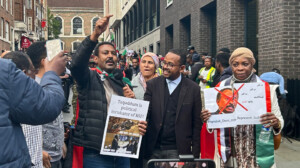Al Bashir’s declaration signals ‘the beginning of the end’
Political parties, the civil and armed opposition, and civil society organisations critique the announcement of a State of Emergency, as an attempt to gain time and halt a revolution.
 Sudan Call meeting in 2018 (file photo)
Sudan Call meeting in 2018 (file photo)
Political parties, the civil and armed opposition, and civil society organisations critique the announcement of a State of Emergency, as an attempt to gain time and halt a revolution.
The National Umma Party, Sudan Call (an alliance of armed movements, civil society organisations, the National Consensus Forces coalition of opposition parties), Justice and Equality Movement (JEM), Doctors Information Office, and Reform Now Movement, announced separately that they would continue to resist the ruling regime until its departure.
After declaring a State of Emergency on Friday, Al Bashir dissolved the national Council of Ministers, assigned the Secretaries General and Undersecretaries of Ministries to run the work of their ministries, assigned a new ‘government of competencies’, relieved the Walis (governors) of the states, dissolved the governments of the states, and appointed high-ranking police and military officers as the new Walis of the states.
Suppression of revolution
Sarah Nugdallah, Secretary-General of the National Umma Party, said that the actions of the President of Sudan are isolated and intended to gain time only. She explained “it does not concern us from near or far, because it does not come close to resolving the current crisis”.

the removal of him and his regime in Sudan (social media)
Sudan Call members described the State of Emergency as an instrument to shed more blood (referring to violent tactics used by security forces to disperse demonstrators) and repress youth.
Yasir Arman, the secretary of foreign relations of Sudan Call and deputy head of the Sudan People’s Liberation Movement North (SPLM-N) said: “The main purpose of Al Bashir's speech is to suppress the revolution through emergency measures and take full control of the organs of the state to prevent any independent role of the army or the Islamists”. He stressed that the solution is to continue the revolution to overthrow Al Bashir.
The secretary-general of Sudan Call and head of the Sudan Liberation Movement (SLM-MM), Minni Minawi, said that Al Bashir's speech was a kind of circumvention strategy against the Declaration of Freedom and Change. The declaration is an initiative of the Sudanese Professionals Association, calling for the formation of a four-year national transitional government before democratic elections.
Minawi said that Al Bashir’s actions are simply a sign that the regime is not ready to respond to the demands of the people.
Prospect of dialogue
In his speech at the Presidential Palace on Friday, Al Bashir also announced the suspension of the constitutional amendment procedures, which would allow him to run for a new term, stressing that the National Dialogue document will be the basis for dialogue with all political forces.
In response to this, Minni Minawi said that Al Bashir and his regime are known for their “lack of seriousness in the peace process” and that the ruling National Congress Party has caused “failure in all agreements with concerned parties”. He compared calling for dialogue with the armed movements with throwing dust in their eyes.
The spokesman for the JEM, Mutasim Saleh, said that the president has tried to “undermine the merits of the revolution by calling for a false dialogue in the format of former National Dialogue”. He stressed that Al Bashir is still “out of touch,” failing to absorb youth’s demands for his departure rather than a change to the calculated positions in the cabinet of his corrupt regime.
Civil society
The Doctors Information Office released a statement detailing the storming of Khartoum Doctors Residence on Saturday. According to the statement, security forces beat doctors and arrested them. They labelled this an “hysterical” act by a government which seems to be in a state of panic.
In their statement, doctors renewed their commitment to strike from non-emergency cases. They described the State of Emergency as a declaration of the beginning of the end.
The deputy head of the Reform Now Movement, Hasan Osman, said, “The emergency does not prevent the masses from going out to the street, because there were already states of emergency, namely in the states of Darfur, Kordofan, Kassala, Blue Nile, which have all experienced demonstrations despite their situation.”











 and then
and then